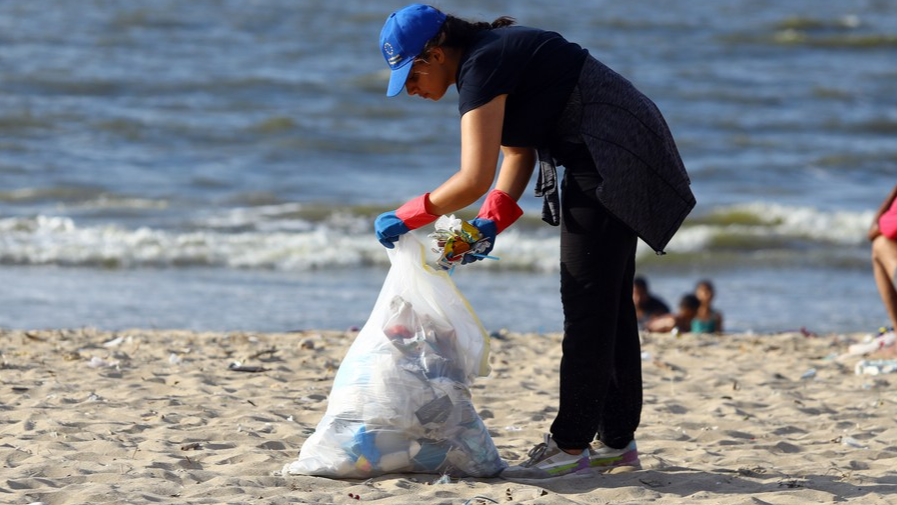
The Global Plastics Treaty can help Southeast Asian countries strengthen policy reforms against plastic pollution and address financing gap in waste management, an online forum heard on Sept 12.
The forum, organized by the Asian Development Bank (ADB), was held ahead of November negotiations on the treaty in Busan, South Korea. The treaty is expected to be enforced by 2025.
Over $16 trillion is needed to reduce plastic pollution worldwide, with the private sector expected to provide most of the funding, experts said.
READ MORE: Clash expected over production limits at UN plastic treaty talks
Anna Fink, senior country economist at the ADB’s Indonesia Resident Mission, said the Global Plastics Treaty, as a legally binding instrument, can strengthen policy reform among signatory countries. Fink cited Indonesia which has regulations on extended producer responsibility (EPR) which mandates that food and plastic production companies are responsible for the upgrading of plastic waste recovery systems.
Fink said enforcement of the regulation on EPR requires a ‘cross-governmental effort’.
“In order to have a cross governmental regulation, it needs to be founded in law. Many of the laws that kind of provide the framework for these activities have been passed many years ago, and they don't necessarily provide the mandate, the legal basis for that kind of cross-governmental activity,” she said.
Fink said the Global Plastics Treaty will give the various ministries in Indonesia that are working on EPR a “very clear mandate to move forward and actually establish a mechanism that would be collecting the fees from producers, which is a key element missing in Indonesia at the moment”.
Umesh Madhavan, research director at The Circulate Initiative, a New York-based non-profit group, said an estimated $1.5 trillion in public expenditure and slightly more than $15 trillion in private sector investments are needed between 2025 and 2040 to reduce global plastic waste.
Madhavan said private investments and capital sources are critical in reducing plastic pollution, especially in developing Asian economies where the cost of plastic pollution is more significant.
“There is also a structural inequity when it comes to dealing with the impact of plastic pollution. Dealing with plastic pollution is eight times more expensive for a lower-middle-income country when compared to a high-income country,” he said.
Madhavan expects a financial mechanism to be set up once the Global Plastics Treaty is enforced. He said blended finance approach can attract both public and private sources of capital to bring about significant environmental and social impacts.
“We are hopeful that the treaty will provide the requisite regulations, and also the financing which is needed to implement that. We need to remember that there's a bigger problem that we are trying to resolve, and we need to mobilize all sources of capital and direct it to the solutions and geographies where it is needed the most,” he said.
The Global Plastics Treaty was first adopted in March 2022 after 175 nations endorsed a resolution to eliminate plastic pollution at the United Nations Environment Assembly in Nairobi, Kenya. The resolution addresses the full lifecycle of plastic, including its production, design and disposal. Several negotiations were held in the succeeding years, with the fifth and final intra-governmental meeting to take place in South Korea this year, from Nov 25 to Dec 1.
Global plastic production has reached over 462 million tons. While the products are useful to our daily lives, 90 percent of them pollute the planet, according to the World Wide Fund for Nature (WWF). Single-use items such as plastic cutlery, packaging, and microplastics are among the most common plastic waste and an estimated 9 million to 14 million tons of plastic waste ends up in our oceans each year.
Plastic pollution has escalated in Southeast Asia in recent years due to urbanization, a growing middle class, and underdeveloped waste management infrastructure.
READ MORE: US to phase out single-use plastics from federal operations by 2035
James Baker, senior circular economy specialist at the ADB, said one of the challenges is the “public behavior with plastics”.
“We do not behave well with plastics. We do not dispose of them. They're too cheap to handle, so we don't have respect for them. And consequently, they end up in the environment,” Baker said.
He said the initial phase is waste management, and then continuing to work with the private sector to identify effective substitutes and reduce the flow of plastics into the market.
Contact the writer at prime@chinadailyapac.com


